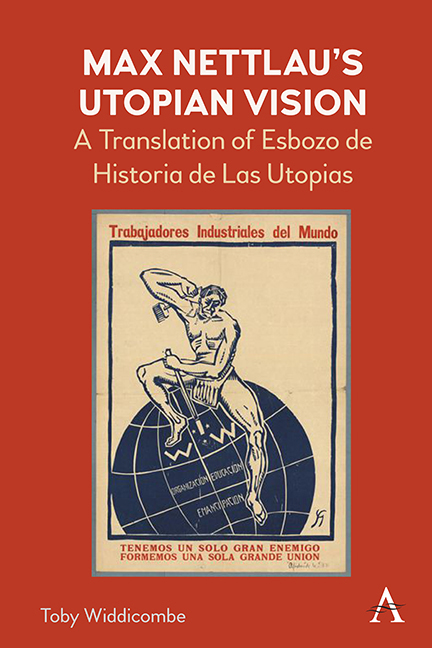Book contents
- Frontmatter
- Dedication
- Contents
- Preface
- Acknowledgments
- Introduction
- Outline of the History of Utopias
- 1 Definition
- 2 The Classical and Medieval Ages
- 3 The Renaissance and Neo-Classical Periods
- 4 The Nineteenth Century (to 1888)
- 5 1888 to the Twentieth Century
- 6 The Twentieth Century: 1900–1925
- Notes
- Appendix A Select Nettlau Bibliography
- Appendix B An Annotated Gazetteer of Nettlau’s Utopians
- Appendix C List of Intentional Communities in Esbozo
- Appendix D List of Utopian Newspapers and Journals in Esbozo
- Bibliography
- Index
2 - The Classical and Medieval Ages
Published online by Cambridge University Press: 18 November 2023
- Frontmatter
- Dedication
- Contents
- Preface
- Acknowledgments
- Introduction
- Outline of the History of Utopias
- 1 Definition
- 2 The Classical and Medieval Ages
- 3 The Renaissance and Neo-Classical Periods
- 4 The Nineteenth Century (to 1888)
- 5 1888 to the Twentieth Century
- 6 The Twentieth Century: 1900–1925
- Notes
- Appendix A Select Nettlau Bibliography
- Appendix B An Annotated Gazetteer of Nettlau’s Utopians
- Appendix C List of Intentional Communities in Esbozo
- Appendix D List of Utopian Newspapers and Journals in Esbozo
- Bibliography
- Index
Summary
From now on when discussing utopias, I have to include authoritarian utopias, for they make up the great majority of texts in the genre. The oldest expressions of libertarian feeling are, one knows, very rare. Rebels at that time primarily acted directly or succumbed to persecution so that even the memory of them has been lost. Their literary works were always quite few and were often lost. In general, one has to be content with the fact that the author of a utopia then almost always had in mind a better state of affairs than existed in his own time, but he could only partly free himself from the thinking of his time, which was most often authoritarian. Utopias in the aggregate, however, present a wide range of viewpoints: from those who accept unrestricted authority, to those who believe it necessary to augment it by regulating everything, to those who try their best to diminish it, to make it disappear, or, at least, to search for what they believe are guarantees against its abuses. Utopias thus present the human spirit grappling with authority, an entity which is considered a panacea by a few and instinctively draped in the cloth of justice by others. How can the people set themselves free, if even the most adventurous spirits who move freely across the terrain created out of their own fantasy almost never know how to bring that freedom about? Now the hour has arrived, but the foremost seekers, after thousands of years, have not arrived there yet.
Utopias arise from thinking about how to govern and to educate, from being aware of social injustice and the monopolizing of land, from the critique of mores, and so on. The Greeks cultivated this genre to a very high degree in myth without their country experiencing any great social convulsions. The Romans didn't write utopias, but there was fighting between plebians and patricians; there was the agrarian war of the Graci, and a fight to the death by the slaves against their masters in the time of Spartacus. They even saw the idealism and the self-denial of the first Christians, but they also experienced the loss of the social ideals of primitive Christianity when superstitions were created and a Christian hierarchy came into being.
- Type
- Chapter
- Information
- Max Nettlau's Utopian VisionA Translation of Esbozo de Historia de Las Utopias, pp. 9 - 14Publisher: Anthem PressPrint publication year: 2023



